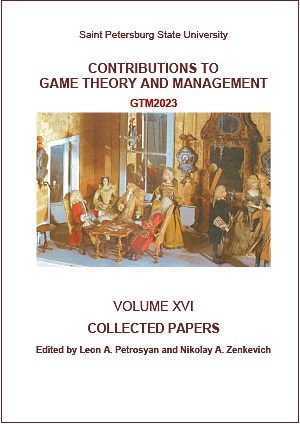Generalized Integral Equations for Timing Games
Abstract
We consider timing games, the payoff functions of which have
additional break lines outside the unit square diagonal. A special case of
such games are games with piecewise constant payoff functions. Solving these
games is reduced to solving a pair of integral equations for the distribution
functions of equalizing strategies. The proposed solution methods can be
used in the study of random walks on a segment in a variable environment.
Keywords:
timing game, game on the unit square, random walks
Downloads
References
Blackwell, D., Girshick, M. A. (1954). Theory of Games and Statistical Decisions. Wiley, New York, 374 p.
Dreser, M. (1961). Games of Strategy. Theory and Applications. Prentice-Hall Applied Mathematics Series, PRENTICE-HALL, INC. ENGLEWOOD CLIFFS, N.J., 352 p.
Feller, W. (1971). An Introduction to Probability Theory and its Applications. Volume (II) Second edition, John Wiley & Sons, Inc. New York - London - Sydney - Toronto, 738 p.
Garnaev, A. (2000). Search Games and Other Aplications of Game theory. Lecture Notes in Economics and Mathematical Systems 485, Springer, 145 p.
Gliksberg, I. L. (1950). Minimax Theorem for upper and lower semi-continuous payoffs. RM-478-PR, The Rand Corporation, October 25.
Gross, O. (1957). A rational game on the square. Contributions to the theory of game, 3, Princeton, 307–311.
Heuer, G. A., Leopold-Wildburger, U. (1995). Silverman's game. Lecture Notes in Economics and Mathematical Systems 424, Springer, 283 p.
Karlin, S. (1959). Mathematical methods and theory in games, programming and economics. London, Paris: Pergamon press.
Lutsenko, M. M. (1986). A game of a prori estimating with an exponential payoff function. Mathematical methods in social sciences, Institute of Economics of the Academy of Sciences of the Lithuanian SSR, Vilnius, 42–47.
Lutsenko, M. M. (1990).On one approach to solving games on the unit square with payoff function k(x-y), part 1. Mathematische Operationsforschung und Statistik. Series Optimization, 21(1), 71–86 (in Russian).
Lutsenko, M. M. (1990). On one approach to solving games on the unit square with payoff function k(x-y), part 2, Mathematische Operationsforschung und Statistik. Series Optimization, 21(3), 453–467 (in Russian).
Lutsenko, M. M. (1993). Generation of optimal signal carrier frequencies against a background of active interference. Journal of Computer and Systems Sciences International, 31(2), 57–62.
Lutsenko, M. M. (2001). Games of timing with additional discontinuity lines. International conference "Logic, Game Theory and Social Choice", St. Petersburg, 158–163.
Lutsenko, M. M. Games of Timing and Random Walks on Interval Frontiers of Dynamic Games. Game Theory and Management, St. Petersburg, 2022, Birkhäuser Cham. (to appear)
Sion, M., Wolf, Ph. (1957). On a game without a value Contribution to the theory of games. III/ Eds. M. Dresher, A.W. Tacker, R.d. Luce, Ann. Math. Study 39. Princeton university, N.Y. Princeton University Press, 299–306.
Ville, J. (1938). Sur la théorie générarale des jeux ou intervient l'habilité des joueurs. In: Traité du calcul des probabilités et de ses applcation, Applications des jeux de hasard, E. Borel et collab. Paris: Gauthier Villars, v. IV, fasc. 2, 105–113.
Vorob'ev, N. N. (1984). Foundation of game theory of non-cooperative games. Nauka, Moscow, 496 p.
Zacks, S. (1971). The theory of statistical inference. John Wiley & Sons, Inc. New York, London, Sydney, Toronto.
Downloads
Published
How to Cite
Issue
Section
License
Articles of "Contributions to Game Theory and Management" are open access distributed under the terms of the License Agreement with Saint Petersburg State University, which permits to the authors unrestricted distribution and self-archiving free of charge.




